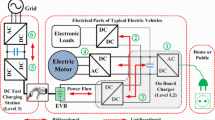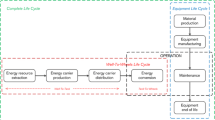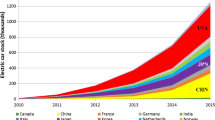Abstract
In order to develop more practical vehicle controllers for hybrid vehicles, performance limitations of hybrid powertrain components need to be considered when constructing power management strategies. This paper introduces a Pontryagin’s Minimum Principle (PMP)-based power management strategy for fuel cell hybrid vehicles which considers not only the fuel consumption minimization but also the requirement on limiting battery state of charge (SOC) usage or on prolonging fuel cell system lifetime.
The battery SOC constraint problem is solved by introducing a new cost function to the PMP-based optimal control problem. The limitation requirements on the battery SOC are satisfied by this solution. In order to take into account the lifetime of a fuel cell system, another cost function is defined and added to the PMP-based optimal control problem. Simulation results show that the lifetime of the fuel cell system can be prolonged by this method. Global optimality is discussed for the two extended cases. The proposed PMP-based power management strategy saves much time compared to dynamic programming (DP) approach while it guarantees global optimality under reasonable battery assumptions.
Similar content being viewed by others
References
Serrao, L. and Rizzoni, G., “Optimal Control of Power Split for a Hybrid Electric Refuse Vehicle,” American Control Conference, pp. 4498–4503, 2008.
Chasse, A. and Sciarretta, A., “Supervisory Control of Hybrid Powertrains: An Experimental Benchmark of Offline Optimization and Online Energy Management,” Control Eng. Pract., Vol. 19, No. 11, pp. 1253–1265, 2011.
Kim, N. W., Cha, S. W., and Peng, H., “Optimal Equivalent Fuel Consumption for Hybrid Electric Vehicles,” IEEE Trans. Control Syst. Technol., Vol. 20, No. 3, pp. 817–825, 2012.
Serrao, L., Onori, S., and Rizzoni, G., “ECMS as a Realization of Pontryagin’s Minimum Principle for HEV Control,” American Control Conference, pp. 3964–3969, 2009.
Rousseau, G., Sinoque, D., and Rouchon, P., “Constrained Optimization of Energy Management for a Mild-Hybrid Vehicle,” Oil Gas Sci. Technol., Vol. 62, No. 4, pp. 623–634, 2007.
Kim, N. W., Rousseau, A., and Lee, D. H., “A Jump Condition of PMP-Based Control for PHEVs,” J. Power Sources, Vol. 196, No. 23, pp. 10380–10386, 2011.
Lescot, J., Sciarretta, A., Chamaillard, Y., and Charlet, A., “On the Integration of Optimal Energy Management and Thermal Management of Hybrid Electric Vehicles,” IEEE Vehicle Power Propulsion Conference, pp. 1–6, 2010.
Serrao, L., Onori, S., Sciarretta, A., Guezennec, Y., and Rizzoni, G., “Optimal Energy Management of Hybrid Electric Vehicles Including Battery Aging,” American Control Conference, pp. 2125–2130, 2011.
Bernard, J., Delprat, S., Buechi, F., and Guerra, T. M., “Fuel-Cell Hybrid Powertrain: Toward Minimization of Hydrogen Consumption,” IEEE Trans. Veh. Technol., Vol. 58, No. 7, pp. 3168–3176, 2009.
Pukrushpan, J. T., Peng, H., and Stefanopoulou, A. G., “Control-Oriented Modeling and Analysis for Automotive Fuel Cell Systems,” J. Dyn. Syst. Meas. Control, Vol. 126, pp. 14–25, 2004.
Pukrushpan, J. T., Stefanopoulou, A. G., and Peng, H., “Control of Fuel Cell Power Systems (Principles, Modeling, Analysis and Feedback Design),” Springer, pp. 15–35, 2004.
Paladini, V., Donateo, T., Risi, A., and Laforgia, D., “Super-Capacitors Fuel-Cell Hybrid Electric Vehicle Optimization and Control Strategy Development,” Energy Conv. Manag., Vol. 48, No. 11, pp. 3001–3008, 2007.
Pukrushpan, J. T., Stefanopoulou, A. G., and Peng, H., “Control of Fuel Cell Breathing,” IEEE Control Systems Magazine, pp. 30–46, 2004.
Lin, W. S. and Zheng, C. H., “Energy Management of a Fuel Cell/ Ultra capacitor Hybrid Power System Using an Adaptive Optimal-Control Method,” J. Power Sources, Vol. 196, No. 6, pp. 3280–3289, 2011.
Johnson, V. H., “Battery Performance Models in ADVISOR,” J. Power Sources, Vol. 110, No. 2, pp. 321–329, 2002.
Kim, N. W., Cha, S. W., and Peng, H., “Optimal Control of Hybrid Electric Vehicles Based on Pontryagin’s Minimum Principle,” IEEE Trans. Control Syst. Technol., Vol. 19, No. 5, pp. 1279–1287, 2011.
Kirk, D. E., “Optimal Control Theory,” Prentice-hall, pp. 227–240, 1970.
Zheng, C. H., Kim, N. W., and Cha, S. W., “Optimal Control in the Power Management of Fuel Cell Hybrid Vehicles,” Int. J. Hydrogen Energy, Vol. 37, No. 1, pp. 655–663, 2012.
Zheng, C. H., Oh, C. E., Park, Y. I., and Cha, S. W., “Fuel Economy Evaluation of Fuel Cell Hybrid Vehicles Based on Equivalent Fuel Consumption,” Int. J. Hydrogen Energy, Vol. 37, No. 2, pp. 1790–1796, 2012.
Borhan, H. A., Zhang, C., Vahidi, A., Phillips, A. M., Kuang, M. L., and Cairano, S. D., “Nonlinear Model Predictive Control for Power-Split Hybrid Electric Vehicles,” 49th IEEE Conference on Decision and Control, pp. 4890–4895, 2010.
Bernard, J., Delprat, S., Buechi, F., and Guerra, T. M., “Global Optimization in the Power Management of a Fuel Cell Hybrid Vehicle (FCHV),” IEEE Vehicle Power Propulsion Conference, pp. 1–6, 2006.
Guezennec, Y., Choi, T. Y., Paganelli, G., and Rizzoni, G., “Supervisory Control of Fuel Cell Vehicles and Its Link to Overall System Efficiency and Low-Level Control Requirements,” American Control Conference, pp. 2055–2061, 2003.
Pei, P. C., Chang, Q. F., and Tang, T., “A Quick Evaluating Method for Automotive Fuel Cell Lifetime,” Int. J. Hydrogen Energy, Vol. 33, No. 14, pp. 3829–3936, 2008.
Author information
Authors and Affiliations
Corresponding author
Rights and permissions
About this article
Cite this article
Zheng, C., Cha, S.W., Park, Yi. et al. PMP-based power management strategy of fuel cell hybrid vehicles considering multi-objective optimization. Int. J. Precis. Eng. Manuf. 14, 845–853 (2013). https://doi.org/10.1007/s12541-013-0111-1
Received:
Accepted:
Published:
Issue Date:
DOI: https://doi.org/10.1007/s12541-013-0111-1




